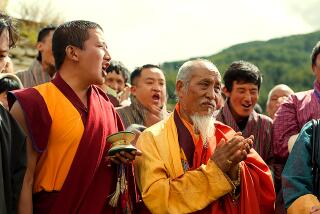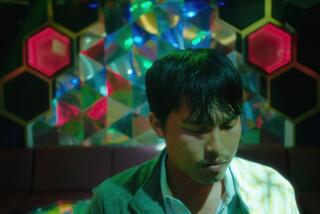Movie review: ‘Uncle Boonmee Who Can Recall His Past Lives’
- Share via
“Uncle Boonmee Who Can Recall His Past Lives” is a one-of-a-kind mixture of the extraordinary and the everyday. It’s a sensory experience that makes its own rules, a dreamy meditation on what is real and what is not. When director Apichatpong Weerasethakul says “Cinema is a man’s way to create an alternate universe,” he is not kidding.
Weerasethakul, a native of Thailand who tells language-challenged Westerners to call him Joe, makes films that confound and delight. “Uncle Boonmee” is straightforward enough to have won the Palme d’Or at Cannes last year, but it is still deeply unconventional, a film whose meaning and structure are often tantalizingly just outside our reach.
Yet even though the film offers little in the way of old-fashioned plot, we hang on every image. We don’t want to miss a moment, even if we’d be hard-pressed to explain or even understand what we’ve seen. For in Weerasethakul’s reflective, contemplative cinema, what happens is not as important as what we’re made to feel.
What is clear is that this is a director with a great sense of the magical and the mystical residing in the everyday. Weerasethakul unmistakably believes in the connection and even overlap between the spirit world and the one we live in, and he conveys it all with the same unhurried, deliberate pace. Who else would have a placid ghost appear at a dinner table only to announce, “Heaven is overrated; there is nothing there.”
Before we get to the ghost, we are introduced to Uncle Boonmee (Thanapat Saisaymar, a non-professional). He is a farmer in Thailand’s north who is dying of acute kidney disease and is having a visit from his sister-in-law Jen and her friend Tony (Weerasethakul regulars Jenjira Pongpas and Sakda Kaewbuadee).
It is at this dinner that the ghost of Huay, Boonmee’s wife (Natthakarn Aphaiwonk), suddenly appears. It’s been 19 years since she’s died, a surprised Boonmee tells her, to which she indifferently replies, “I have no concept of time any longer.”
No sooner do the dinner guests get used to Huay’s presence than who should walk up the stairs but Boonmee’s long-lost son, Boonsong (Geerasak Kulhong). Not that anyone recognizes him at first. Boonsong looks, frankly, like a Thai version of a super hairy “Star Wars” Wookiee, complete with tiny red coals for eyes. He looks this way, he says, because he became infatuated with elusive Sasquatch-type creatures called monkey ghosts and ended up mating with one of them.
The key point here is not so much the strangeness of these visitors but how quickly Boonmee and his friends get used to having them around. Boonmee passes around a photo album so everyone can catch up, and things get so cozy that Jaai (Samud Kugasang), a native of Laos who works for Boonmee, truthfully says, “I feel like the strange one here.”
“Uncle Boonmee” continues with Boonmee’s story in ways that are just as strange and even more nonlinear. There’s even a folkloric interlude involving a plain young princess who becomes intimate with a talking catfish under a waterfall. It’s that kind of a movie.
But not totally. For one of the interesting things about “Uncle Boonmee” is that its universe is not completely a fantastical one. Such real-world issues as hostility to and fear of illegal immigration are touched on, as are the mechanics of dialysis and Boonmee’s worries that his killing of Communists as a member of the Thai armed forces in his younger days has affected his karma. It is, as noted, the connection between the two worlds that holds the director’s attention.
What inevitably draws us back into “Uncle Boonmee,” however is the film’s wealth of quietly haunting imagery. Perhaps most lasting is a striking sequence of a buffalo in the forest, looking both real and unreal as it stands alone in a kind of twilight with smoke and mist rising around it. It’s an image that holds us almost despite ourselves, an image that seems to appeal to a deeper part of our nature. As the ghostly Huay says in another context, “Earthly matters never cease to surprise.”
More to Read
The biggest entertainment stories
Get our big stories about Hollywood, film, television, music, arts, culture and more right in your inbox as soon as they publish.
You may occasionally receive promotional content from the Los Angeles Times.











